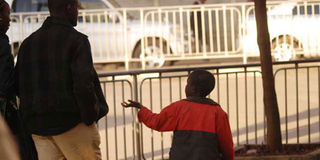Kenya needs to look after its children better

A child beggar stretches out her hand for money from pedestrians in Nairobi along Moi Avenue on November 30, 2013.
What you need to know:
- These vulnerable categories of children illustrate the disintegration of the family support system, a reflection of our poor social protection mechanisms, and a slack child care and protection system.
- Childhood, according to child protection experts and researchers, has a crucial influence on the health, social, and economic standing of a society.
Kenya treats its children, especially orphans and those who are vulnerable, shabbily.
It is estimated that between 250,000 and 300,000 children are on the streets and around 50,000 in children’s homes.
Most of these children have families that are unable to look after them due to poverty. These vulnerable categories of children illustrate the disintegration of the family support system, a reflection of our poor social protection mechanisms, and a slack child care and protection system.
Childhood, according to child protection experts and researchers, has a crucial influence on the health, social, and economic standing of a society.
Kenya is struggling with a large population of broken adults and youth bedevilled with social and behavioural and health problems and illiteracy.
Many of these problems are associated with inattention to childhood. Research shows that allocation of resources and provision of services to childhood are a strong determinant of a healthy nation.
Similarly, economists have argued that investment in children is the greatest that a nation can make.
Our country has failed to provide a safe and enabling environment for vulnerable and at-risk children to grow up in.
The government, which is supposed to be the primary actor, has relegated its responsibility to charity organisations.
Streets in towns are the homes of hordes of child beggars. Few of these children have serious rehabilitative concerns, but the government and many civil society actors have responded to their plight sweepingly, superficially, and in an inhumane way.
Some politicians have called for the construction of warehouses to clear them from the streets. Some non-governmental actors accommodate many of these vulnerable children in homes without paying attention to their essential needs and rights.
IMPORTANCE OF FAMILY
These approaches are naive and expose our ignorance to evidence-based approaches to child care and protection.
Clearing children from the streets and warehousing them in these large residential facilities simplifies their needs to just survival (physical and material needs) and veils the underlying issues.
Besides, there is evidence that these large facilities reinforce vulnerabilities. Children in such institutions are four times more likely to experience violence than those in families.
Additionally, children in these facilities are likely to have more life-long socio-emotional and psychological challenges.
It is pertinent that well-meaning actors base their interventions on research to improve children’s well-being.
Although we cannot romanticise the family unit, it is important to note that research shows that children’s socio-cultural, emotional, and psychological needs are better addressed in the family.
Furthermore, the family is a unit that provides a sense of identity and belonging to children.
The United Nations convention on the Rights of the Child, which Kenya has ratified, defines the family as the fundamental unit of society and the natural environment to meet the fundamental needs to enhance children’s well-being.
It is, hence, the primary role and responsibility of the government to prevent unnecessary separation of children from their communities and families.
Although the cash transfer programme is a commendable family protection initiative, the government should also step up its role to enhance, adopt, and implement family-friendly protection measures.
In collaborative efforts with non-governmental actors, the government should enhance allocation of resources and psycho-social services to ensure that all at-risk children are supported to access health care, education, food, and shelter, and to thrive in caring and loving families.
Mr Ucembe is regional advocacy manager, Hope and Homes for Children. [email protected].




